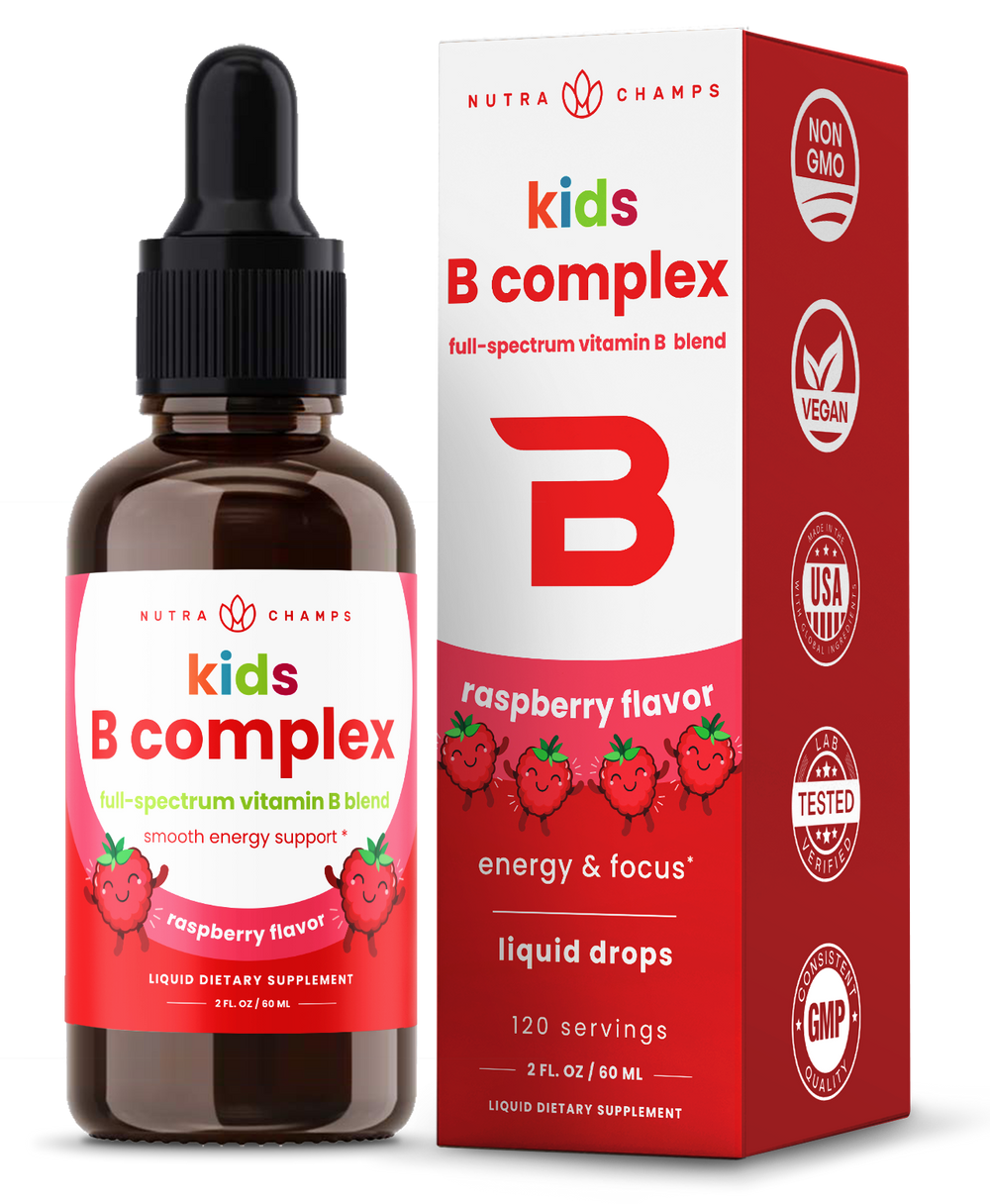Your trusted source for simple, practical nutrition advice and tips for a healthier lifestyle.
Children’s B vitamins are essential for energy production and overall health. They support brain function, growth, and development.
B vitamins play a crucial role in a child’s health. They help convert food into energy, which is vital for growth and development. These vitamins also support brain function, which is essential for learning and cognitive development. Vitamin B12, for instance, aids in the formation of red blood cells and maintaining a healthy nervous system.
A balanced diet typically provides sufficient B vitamins, but some children may need supplements. Consulting a pediatrician ensures that your child gets the right amount of these essential nutrients. Proper intake of B vitamins can prevent deficiencies that lead to various health issues.
Importance Of B Vitamins
B vitamins are essential for children’s health and development. They play a key role in various bodily functions. From energy production to growth, B vitamins are vital for kids.
Role In Growth
B vitamins contribute significantly to a child’s growth. They help the body produce new cells. This is crucial for growing bones and muscles. Without enough B vitamins, children may experience growth delays.
Vitamin B12 and folic acid are particularly important. They support DNA production, which is necessary for cell growth. Ensuring an adequate intake of these vitamins can promote proper development.
Energy Production
Children need a lot of energy for their daily activities. B vitamins help convert food into energy. This is essential for active kids. Vitamin B1 (Thiamine), Vitamin B2 (Riboflavin), and Vitamin B3 (Niacin) are key players in this process.
These vitamins support the metabolism of carbohydrates, fats, and proteins. By doing so, they help maintain high energy levels. This keeps kids active and focused throughout the day.
| B Vitamin | Role | Sources |
|---|---|---|
| Vitamin B1 (Thiamine) | Energy production | Whole grains, meat, and nuts |
| Vitamin B2 (Riboflavin) | Metabolism support | Milk, eggs, and green vegetables |
| Vitamin B3 (Niacin) | Energy release | Poultry, fish, and peanuts |
| Vitamin B12 | DNA production | Meat, dairy, and fortified cereals |
| Folic Acid | Cell growth | Leafy greens, beans, and citrus fruits |
To ensure proper intake of B vitamins, a balanced diet is key. Include a variety of foods rich in these vitamins. This will support your child’s growth and energy needs effectively.
Types Of B Vitamins
B Vitamins play a crucial role in children’s growth. Each type of B Vitamin has unique benefits. Let’s explore the different types of B Vitamins your child needs.
B1: Thiamine
Thiamine helps convert food into energy. It supports the brain and heart function. Kids need thiamine for a healthy nervous system.
- Boosts energy levels
- Supports brain function
- Improves heart health
B2: Riboflavin
Riboflavin helps the body break down proteins, fats, and carbohydrates. It is essential for growth and overall good health.
- Promotes healthy skin and eyes
- Boosts energy production
- Supports growth and development
B3: Niacin
Niacin helps the body convert food into energy. It also supports the digestive system, skin, and nervous system.
- Improves digestion
- Promotes healthy skin
- Supports the nervous system
Daily Requirements
Understanding the daily requirements for children’s B vitamins is essential. B vitamins play a crucial role in growth and development. They help convert food into energy and support the nervous system.
Age-specific Needs
Children’s B vitamin needs vary by age. Here’s a breakdown of age-specific requirements:
| Age Group | Daily B Vitamin Needs |
|---|---|
| 0-6 months | 0.3 mg (B1), 0.4 mg (B2), 2 mg (B3) |
| 7-12 months | 0.5 mg (B1), 0.5 mg (B2), 4 mg (B3) |
| 1-3 years | 0.5 mg (B1), 0.5 mg (B2), 6 mg (B3) |
| 4-8 years | 0.6 mg (B1), 0.6 mg (B2), 8 mg (B3) |
| 9-13 years | 0.9 mg (B1), 0.9 mg (B2), 12 mg (B3) |
Recommended Dosages
Ensuring children receive the right dosage is vital. Here are the recommended dosages:
- Vitamin B1 (Thiamine): Essential for energy production.
- Vitamin B2 (Riboflavin): Important for growth and red cell production.
- Vitamin B3 (Niacin): Helps maintain healthy skin and nerves.
- Vitamin B6 (Pyridoxine): Supports brain development.
- Vitamin B12 (Cobalamin): Crucial for neurological function.
For more detailed information, consult with a pediatrician. They can provide personalized advice based on specific needs.

Sources Of B Vitamins
Understanding the sources of B vitamins is crucial for children’s health. These essential nutrients play a vital role in energy production, brain function, and overall growth. This section explores the different ways children can get their B vitamins through diet and supplements.
Dietary Sources
Children can get B vitamins from various foods. Here is a list of some rich sources:
- Meat: Chicken, turkey, and red meat provide B12 and B6.
- Dairy: Milk, cheese, and yogurt are great for B2 and B12.
- Eggs: Eggs are rich in B2, B12, and B5.
- Fruits: Bananas and avocados offer B6 and B5.
- Vegetables: Spinach, broccoli, and potatoes are good for B6 and B9.
- Whole Grains: Brown rice, oats, and barley provide B1, B2, and B3.
- Nuts and Seeds: Almonds, sunflower seeds, and peanuts are rich in B7 and B9.
Supplement Options
If dietary sources are insufficient, supplements can help. Here are some popular options:
| Supplement | B Vitamins Provided |
|---|---|
| Multivitamins for Kids | B1, B2, B3, B6, B12, B9 |
| B-Complex Gummies | B1, B2, B3, B5, B6, B7, B9, B12 |
| Liquid B-Vitamin Drops | B1, B2, B3, B5, B6, B7, B9, B12 |
Always consult a pediatrician before starting any supplements. This ensures the right dosage and product for your child’s needs.
Benefits For Children
Children’s B vitamins play a crucial role in their overall development. These vitamins support growth, cognitive functions, and the immune system. Here are the key benefits of B vitamins for children.
Cognitive Development
B vitamins are essential for brain health and cognitive development. They help in the formation of neurotransmitters, which are vital for communication between brain cells.
B vitamins like B6, B9, and B12 support memory and learning abilities. They also aid in the production of energy, which keeps the brain active and alert.
Here’s a table showing the specific B vitamins and their cognitive benefits:
| B Vitamin | Benefit |
|---|---|
| B6 | Supports neurotransmitter function |
| B9 (Folate) | Aids in brain development |
| B12 | Enhances memory and learning |
Immune Support
B vitamins are also vital for a strong immune system. They help produce white blood cells, which fight off infections.
Vitamins B6, B9, and B12 are particularly important for immune support. They ensure the body can respond to illnesses effectively.
- B6 helps in antibody production.
- B9 supports cell division and growth.
- B12 maintains healthy blood cells.
Include B vitamins in your child’s diet to keep their immune system strong and healthy.
Signs Of Deficiency
Children need B vitamins for growth and energy. Deficiency can cause many issues. Let’s explore the common symptoms and health risks associated with B vitamin deficiency in children.
Common Symptoms
B vitamin deficiencies often show noticeable symptoms. Here are some common signs:
- Fatigue and weakness
- Poor appetite
- Irritability and mood changes
- Pale skin
- Numbness or tingling in hands and feet
- Difficulty concentrating
Parents should observe these symptoms closely. Early detection helps in quick intervention.
Health Risks
Ignoring deficiency can lead to severe health risks. Some potential risks include:
| Vitamin | Health Risk |
|---|---|
| B1 (Thiamine) | Can cause nerve damage and heart issues. |
| B2 (Riboflavin) | May result in skin disorders and sore throat. |
| B3 (Niacin) | Leads to pellagra, causing skin and digestive issues. |
| B6 (Pyridoxine) | Can cause anemia and skin rashes. |
| B9 (Folate) | May result in growth problems and megaloblastic anemia. |
| B12 (Cobalamin) | Leads to neurological issues and pernicious anemia. |
Ensuring children get enough B vitamins is vital. It supports their overall health and development.
Incorporating Into Diet
Ensuring your child gets enough B vitamins can be simple. These essential nutrients support their growth and energy levels. Here are practical tips and delicious recipes to help.
Meal Planning Tips
- Include a variety of foods: Offer whole grains, dairy, meat, and green vegetables.
- Balance meals: Combine protein, carbs, and healthy fats in every meal.
- Snack smart: Choose fruits, nuts, and yogurt for quick, healthy snacks.
Kid-friendly Recipes
| Recipe | Description |
|---|---|
| Banana Pancakes | Mix bananas, eggs, and oats for a nutritious breakfast. |
| Spinach Omelette | Blend eggs with fresh spinach for a B-vitamin boost. |
| Chicken Wraps | Fill whole wheat tortillas with chicken, veggies, and cheese. |
These tips and recipes make it easy to incorporate B vitamins into your child’s diet. They will enjoy the tasty meals and snacks, while you can rest assured they’re getting the nutrients they need.

Credit: www.nutrachamps.com
Consulting Healthcare Providers
Consulting healthcare providers is essential when giving children B vitamins. Experts can provide tailored advice. They ensure kids get the right nutrients safely.
When To Seek Advice
Parents should seek advice when unsure about their child’s vitamin needs. It’s crucial if the child shows signs of deficiency. Symptoms include fatigue, irritability, or slow growth. Consulting a doctor helps determine the right dosage.
Healthcare providers can also check for allergies. Some children might react to certain supplements. Seeking advice avoids potential health risks.
Choosing Supplements
Choosing the right supplement is important. Healthcare providers can recommend trusted brands. They ensure the supplement is appropriate for the child’s age and health.
Parents should look for supplements with clear labels. Labels should list all ingredients and dosages. Healthcare providers can help interpret these labels.
It’s also wise to choose supplements that are free from artificial additives. Natural options are usually safer for children. Consulting a healthcare provider ensures the best choice.
| When to Seek Advice | Choosing Supplements |
|---|---|
| Unsure about vitamin needs | Trusted brands recommended by experts |
| Signs of deficiency | Clear labels with ingredient lists |
| Potential allergies | Free from artificial additives |
- Fatigue
- Irritability
- Slow growth
In summary, consulting healthcare providers ensures children get the right B vitamins safely. It helps avoid deficiencies and ensures proper growth.

Credit: www.amazon.com
Frequently Asked Questions
What Are B Vitamins?
B vitamins are essential nutrients that support energy production, brain function, and cell metabolism. They are crucial for children’s growth and development.
How Do B Vitamins Benefit Children?
B vitamins help children by supporting their energy levels, brain development, and overall growth. They also aid in the production of red blood cells.
What Foods Are Rich In B Vitamins?
Foods rich in B vitamins include whole grains, meat, eggs, dairy products, legumes, seeds, and leafy greens.
Can Children Take B Vitamin Supplements?
Yes, children can take B vitamin supplements if recommended by a healthcare provider. It’s important to follow the dosage instructions.
Conclusion
Ensuring children get adequate B vitamins is crucial for their overall health and development. These essential nutrients support energy, brain function, and growth. Incorporate a balanced diet rich in B vitamins to help your child thrive. Consult with a healthcare professional for personalized advice on supplementation and dietary needs.





